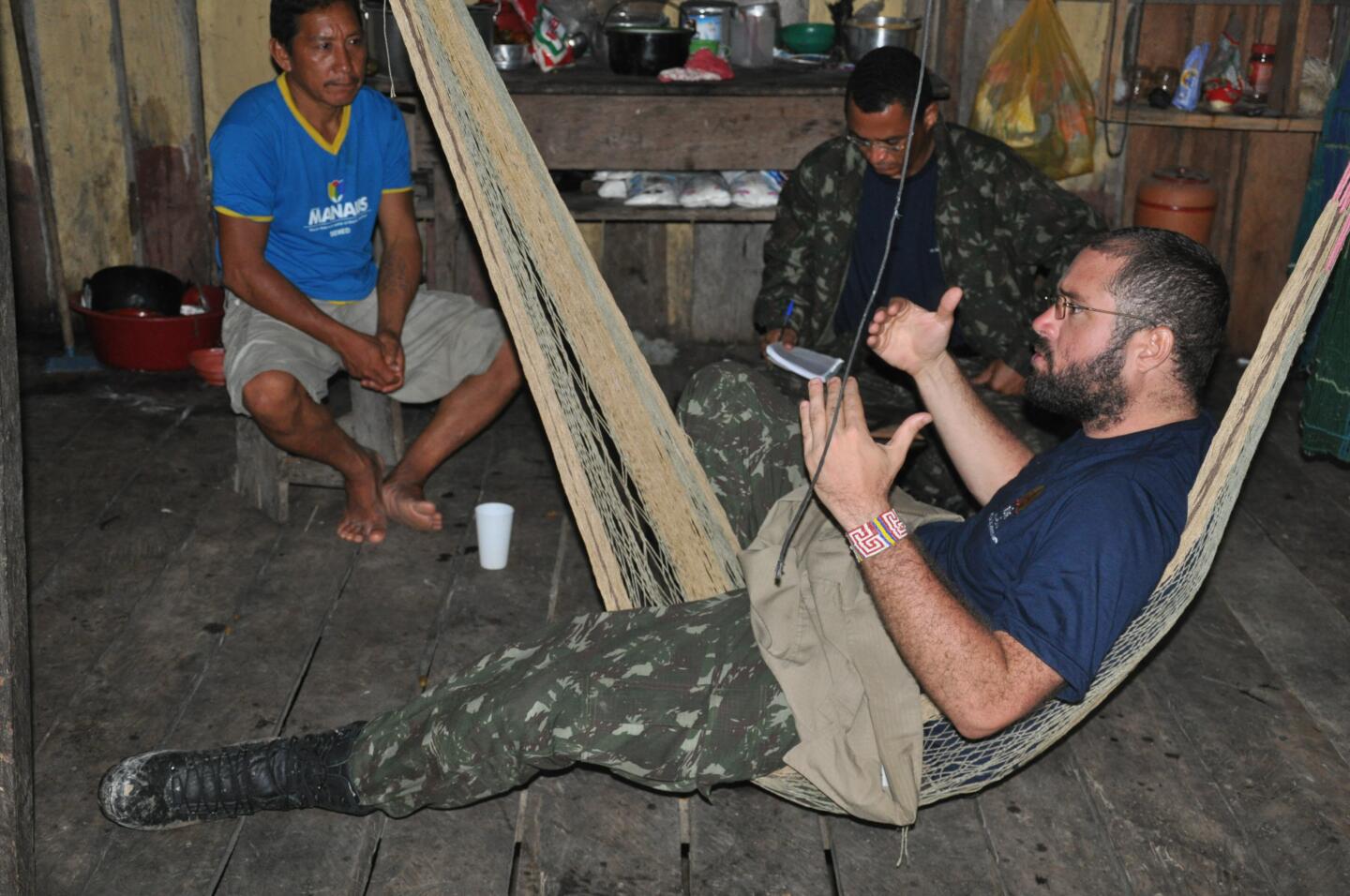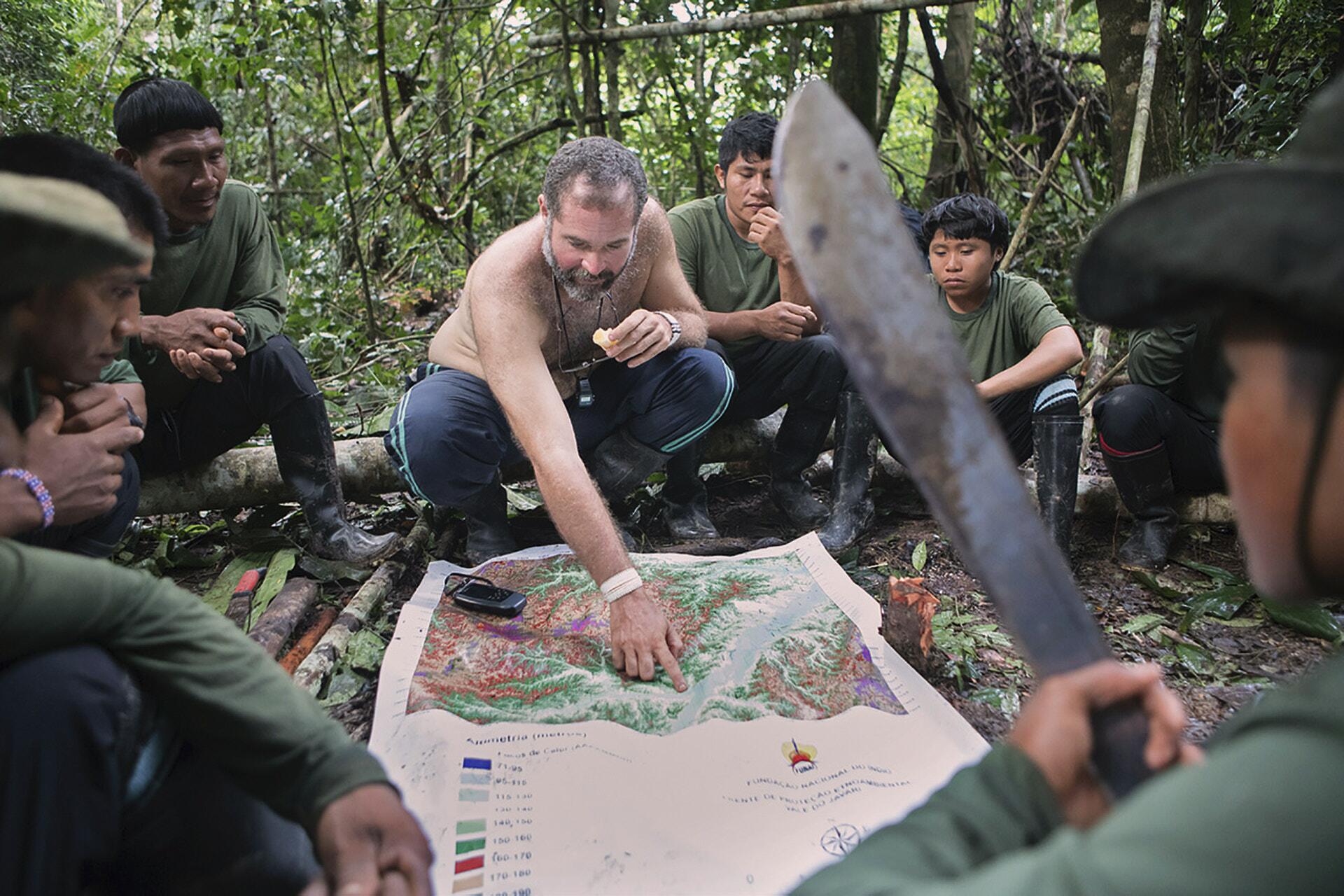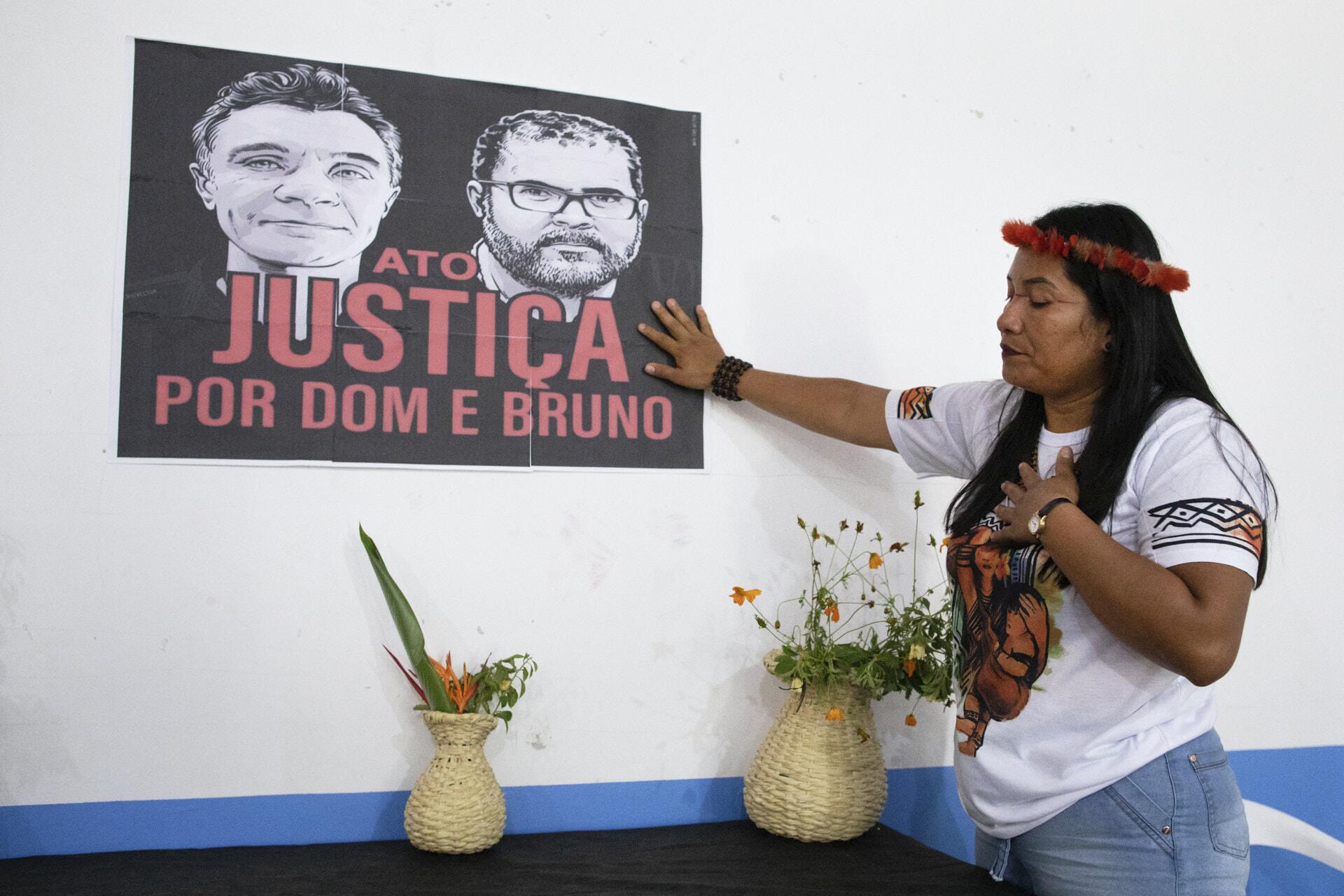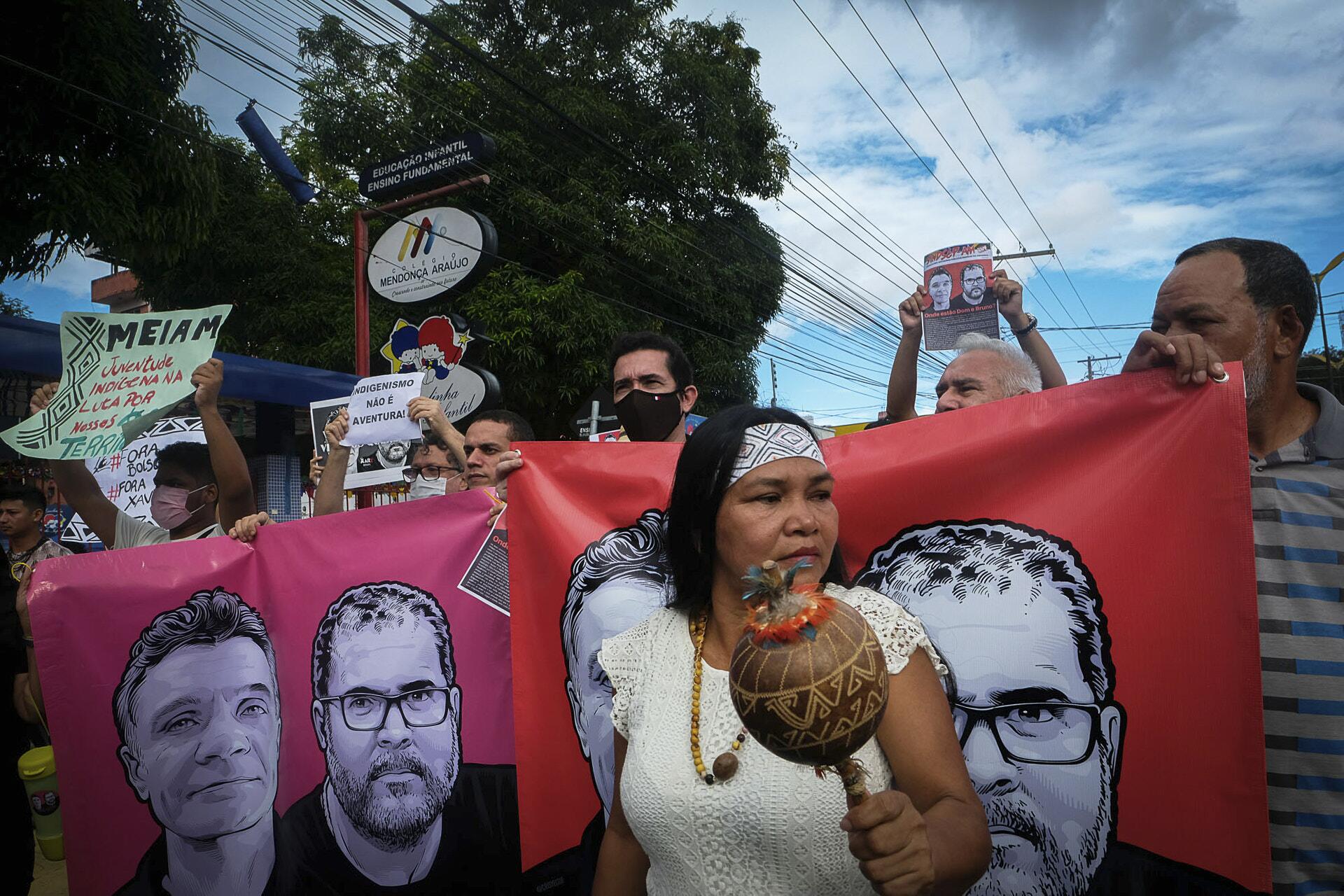When the Indigenous expert Bruno Pereira was killed in the Javari Valley on June 5, 2022, each of the region’s eight contacted Indigenous peoples dealt with the loss according to their rituals. The Kanamari people mourned for a whole year, as is their custom when a relative dies: the survivors shave their hair, some crops are forbidden, certain types of craftwork are not produced, and songs and tears are showered on the memory of the deceased. The Union of Indigenous Peoples of the Javari Valley (Univaja), the organization for which Bruno worked when he was killed, changed its logo as a sign of mourning. The logo, which previously contained a drawing of mountains, palm trees and a bird, inside a circle, now shows a black ribbon. On the anniversary, June 5, 2023, the mourning ends and the Univaja logo will once again represent the Javari Valley. The black ribbon will disappear, but the intense relationships that Bruno built with the people of the Javari Valley and throughout Brazil will live on.
The Kanamari villages were the first ones Bruno visited when he arrived in the Atalaia do Norte region in 2010. There, he had experiences with ayahuasca and learned to sing traditional songs. One of them was the Kanamari song that he chanted in the middle of the forest, in images that went viral when Bruno and Dom were missing in June 2022. Sitting on the forest floor, at the foot of a tree, singing about a macaw and its young, with a chorus by his Indigenous relatives] , Bruno Pereira became known worldwide. Warrana-raraê, warrana-raraê, he sang, with a smile on his face.

Bruno Pereira always dreamed of working with Indigenous people. Photo from the National Foundation of Indigenous Peoples’ (Funai’s) collection provided to SUMAÚMA for the publication of this article
That song revealed the beauty, the sweet nature, and the love for the forest and the Indigenous peoples that were the key factors that made our big, strong, brave friend the person he was. The song became a samba, when Rio de Janeiro’s Porto da Pedra School staged a parade during the 2023 Carnival in memory of Bruno, Dom and two other Amazon martyrs,, Chico Mendes and Dorothy Stang. The tune was sampled in music by André Abujamra. It was sung by the Rabbi Uri Lam, from the Congregação Israelita Tempo Beth-El, in the city of São Paulo, in a Kadish, a Jewish prayer of mourning. And it entered the popular imagination. The song Kanamari became an incarnation of Bruno, his own version of eternity.
Bruno Pereira and Dom Phillips have been transmuted into music, into memes, into street protests, into posts on social media, into images projected onto Big Ben in London. The two are remembered in many of the speeches made by the Minister of the Environment and Climate Change, Marina Silva, and the Minister of Indigenous Peoples, Sonia Guajajara. We cannot overlook the fact that they were victims of one of the most brutal crimes that Brazil has ever witnessed.
Ver essa foto no Instagram
Today, in justice circles, the murder is being treated as one of the most important criminal cases currently underway in the country. One of the main strategies of the assassins’ defense team has been to cast aspersions on the memory of the Indigenous expert – which, up to this point, seems to have been successful, as there are journalists who are only too willing to reproduce lies and slanders against him. It is to defend Bruno Pereira’s legacy that we are speaking out today, to restore the truth regarding the seriousness of his work in promoting the rights of Indigenous peoples, particularly uncontacted groups.
Bruno da Cunha Araújo Pereira passed the competitive examination for the National Foundation of Indigenous Peoples (Funai) in 2010 and went to work in the Regional Coordination Office of the Javari Valley. Prior to this, for seven years, he had worked in the region of the Balbina hydroelectric power plant, on the Uatumã river, in the northeast part of the state of Amazonas, where he coordinated reforestation activities. He had always dreamed of working with Indigenous peoples. In Uatumã, he learned how to walk in the forest with the woodsmen. Bruno had no trouble adapting when he arrived in the municipality of Atalaia do Norte, a small town on the lower part of the Javari River, at the mouth of the Itaquaí River, on the border with Peru. When he arrived, he boarded canoes that took him upriver to the villages, contradicting the wishes of his then-boss, who wanted to keep him just at the head office, working in the city.
The Ituí River was one of his first destinations, visiting the villages of the Marubo people. He worked with immense energy and enthusiasm – which he maintained right up until the end. He took real pleasure in talking with Indigenous people in the villages. When he visited the Kanamari communities, he got closer to the Javari Valley Ethno-Environmental Protection Front. This was the start of his connection with the topic of the uncontacted peoples. The Javari Valley is the part of the world that has the greatest number of Indigenous groups that refuse contact with the outside world. There are 16 records of the presence of these peoples, 11 of which have been confirmed by Funai. The remaining ones require further studies and expeditions to be carried out for the purpose of collecting irrefutable proof of their existence.
Ending collective voting by Indigenous people
In 2012, Bruno took over as the Regional Coordinator of the Javari Valley. During his four years in charge of the local Funai office, he invested in the supervision of the Javari Valley Indigenous Land, established a new surveillance base on the Curuçá river, and gave his unrestricted support to the protection of the territories of uncontacted and recently contacted Indigenous peoples.
In addition to prioritizing surveillance, Bruno’s achievements included installing polling stations in the villages starting with the 2014 elections. He realized that the absence of electronic voting machines in the villages was an obstacle to the Indigenous people’s participation in the elections. Before he implemented this change, the residents of the Indigenous land had to spend several days going down the river to Atalaia do Norte, often with fuel donated by candidates who were interested in their votes, reproducing the old practice of the collective vote. The groups were transported from the villages to the city to vote and then just left there, with no way of returning home. At least three Indigenous children died in the port of Atalaia do Norte, after the elections, on account of the unsanitary conditions.
Besides preserving Indigenous lives, Bruno also changed the composition of the local legislature. In 2012, just one Indigenous person was elected to the City Council. In the following election, in 2016, six indigenous people became town councilors, out of a total of 11 seats, which was an all-time record. Today, the electoral office of Atalaia do Norte bears the name of Bruno Pereira, an acknowledgment made by the Regional Electoral Court of the state of Amazonas.

BRUNO PEREIRA, IN 2018, DURING FIELDWORK IN THE JAVARI VALLEY. PHOTO: ©GARY CALTON
Bruno always had an inclination for management. After his time at Funai’s Regional Coordination Office in Atalaia do Norte, the unit became a reference in Brazil, from 2015 onward, as one of the most efficient in the country. Between 2016 and 2018, Bruno undertook a series of expeditions to locate uncontacted Indigenous people in the Javari Valley. These expeditions were risky affairs, which required a great deal of preparation. His wife, Beatriz Matos, recounts that he used to spend entire days in their house’s office in the city of Belém, with a large map of the Javari Valley open on the floor, meticulously planning every detail of the routes he would cover. These expeditions are fundamental for the protection of the uncontacted peoples, because they confirm the existence and location of such groups and enable a better understanding of the territory’s conditions. This work highlights the excellent field coordination that Bruno developed throughout his career.
In 2018, in recognition of his work and expertise, Bruno was put in charge of the General Coordination of Uncontacted and Recently Contacted Indigenous Peoples in Brasilia. This coordination office is responsible for the public policy directed at these peoples and for managing the 11 Ethno-Environmental Protection Fronts, units dedicated exclusively to working on this matter. In this position, Bruno and his team came up with the Korubo Program, a vanguard initiative to organize and systematize a specific Indigenous action with recently contacted peoples. This period also saw the publication of Inter-Ministerial Directive number 4,094, by Funai and the Ministry of Health, with norms and methods for civil servants to use when meeting uncontacted peoples and in the case of epidemics among these populations. The directive played a crucial role in guiding the contingency plans developed during the response to the Covid-19 pandemic. It was in this context that Bruno organized the largest contact expedition made in the last few decades in Brazil.
In 2019, the Indigenous expert coordinated the search to contact a Korubo group that was living in isolation, but was getting close to the Matis’ villages, with imminent risk of new conflicts. The expedition was considered one of the most successful in the history of Brazilian Indigenism, with total control of the health risks and without any serious incidents or contamination. Bruno’s murderers even made up lies about this. On May 17, Funai had to publish a statement denying that any deaths had occurred during the expedition.

Indigenous people hold a protest in defense of their territories and in honor of the Indigenous expert Bruno Pereira and the journalist Dom Philips. Photo: Pedro Ladeira/Folhapress
Maxciel Pereira was the first one to fall
In the first year of the Bolsonaro government, with its genocidal policy of not demarcating a single centimeter of Indigenous land, one of the first victims was Maxciel Pereira, the Indigenous expert responsible for inspections in the Javari Valley during the period in which Bruno was the local coordinator. He was gunned down on the busiest avenue in the municipality of Tabatinga, after taking part in inspection actions in the Javari Valley. At the same time, Bruno was organizing, together with other agencies, a mega operation against illegal gold mining activities in the region, the so-called “Operation Korubo,” which destroyed more than 60 illegal mining rafts on the Jutaí river. The operation took place just a few days after Maxciel’s death in September 2019. Shortly afterwards, Funai’s president under the Bolsonaro government, Marcelo Xavier, dismissed Bruno and, in his place, appointed a pastor linked to the evangelical Missão Novas Tribos do Brasil (Brazil New Tribes Mission), which has a track record of involvement in contacts and the forced evangelization of Indigenous peoples.
Bruno felt persecuted by Funai’s and Brazil’s anti-indigenous administration. He saw that he would not be able to continue with his work of Indigenism and promoting Indigenous rights, and so he took a leave of absence. He then began to coordinate a team, helping shape what would become the Observatory for the Human Rights of Uncontacted and Recently Contacted Peoples (Opi), which intensified its efforts to tackle the advance of Covid-19 in these lands. In collaboration with the Alliance of Indigenous Peoples of Brazil (Apib) and the Coordination of Indigenous Organizations of the Brazilian Amazon (Coiab), Bruno and Opi filed a petition with the Federal Supreme Court in order to guarantee health protection of Indigenous areas during the pandemic.
These were years of resistance. Bruno’s coordination was crucial to the publication of the National Human Rights Council’s resolution with guidelines and recommendations regarding the policy for uncontacted and recently contacted peoples. Opi began to produce technical reports to guarantee the protection of territories occupied by uncontacted indigenous peoples for which the government was threatening to formally remove protection, such as the Ituna-Itatá people, in the state of Pará, and the Piripkura people, in the state of Mato Grosso. Together with Coiab and other indigenous organizations Bruno created the Uncontacted or Decimated Peoples campaign, which collected 26,000 signatures requesting that the uncontacted peoples’ forests continue to be protected.

The Union of Indigenous Peoples of the Javari Valley (Univaja), in the town of Atalaia do Norte (in the state of Amazonas), organized a farewell ceremony for the Indigenous expert and the journalist, in 2022. Photo: Foto: João Laet/AFP
Tireless and persistent, Bruno also began to collaborate with Univaja, particularly in the creation and training of the Surveillance Team. “The Indigenous people are the ones who will secure the Indigenous land and the protection of the uncontacted groups,” he used to say. By this point, Bruno had already learnt that the State is flawed and that supporting Indigenous peoples’ autonomy was the best way to protect their territories. And it was in this way, doing what he believed in, supporting indigenous initiatives, that his life was snuffed out, along with that of his friend and partner Dom Phillips. During the days in which the two were missing, in the face of denials by the Brazilian State to reinforce the search, it was the indigenous teams, for the most part made up of men from the Matis people, who tireless went up and down the rivers, until they found the remains that led to the arrests. There is no greater recognition of Bruno’s importance to the Indigenous people.
The criminal negligence of Bolsonaro’s men
We now know that, shortly after Maxciel’s death, Marcelo Xavier and his general monitoring coordinator Alcir Amaral Teixeira ignored all appeals from the agency’s employees to guarantee protection for the territory and greater security for the Javari Valley. The Federal Police identified them, as being responsible, by default, for Bruno’s and Dom’s murders. The investigation into their deaths has not yet been concluded, and the investigation into the circumstances of Maxciel’s murder, which have never been explained, has been reopened.
One of Bruno’s teachers, Rieli Franciscato, was also a victim of Bolsonaro’s anti-Indigenous policy. He was killed by an arrow shot by uncontacted Indigenous people in 2020. The most likely hypothesis is that the Indigenous people, cornered by invaders and disturbed by the record deforestation rates on the Uru Eu Wau Wau land, were terrified by his approach, which he was making precisely in an attempt to check whether or not an invasion was taking place. It is no coincidence that, in four years of government, three important Indigenous experts, all of whom were working with uncontacted peoples, have been killed. All of Brazil has suffered their loss.
Today, the Javari Valley ends its year of mourning and we here, at Opi, remember our friend Bruno Pereira with nostalgia. It is our mission to defend his legacy at a crucial moment for Indigenous rights in Brazil. The House of Representatives approved Bill 490, which seeks to establish a “timeframe thesis” (marco temporal) for the demarcation of indigenous lands, stripping dozens of peoples who were massacred and expelled from their lands of their rights. The project envisages that only those lands that were occupied by Indigenous people in October 1988, when the Constitution was enacted, will be demarcated, and resumes the policy of forced contact with uncontacted peoples for construction works of “public interest”. The proposal is an affront to the Constitution and to the memory of Bruno and Dom, as well as to the Federal Supreme Court, which has scheduled to resume the judgment on the same question on June 7, in a process that has been dragging on since 2021. Congress is also trying to dismantle the Ministry of Indigenous Peoples and the Ministry of Environment and Climate Change, removing crucial powers from both of them. It is as if the Brazilian political class that controls Congress is trying to forcibly return to the worst policies of the government that was defeated at the ballot box in 2022. These are the very same policies that contributed to Bruno and Dom’s deaths. Their sacrifice cannot have been in vain. To approve this legislation is to murder them once again.
(*) Members of the Observatory for the Human Rights of Uncontacted and Recently Contacted Peoples (Opi).
Spell check (Portuguese): Elvira Gago
Translation into Spanish: Meritxell Almarza
English translation: Mark Murray
Photography editing: Marcelo Aguilar, Mariana Greif and Pablo Albarenga
Page setup: Érica Saboya

After the confirmation of the murders of Bruno Pereira and Dom Phillips, in June 2022, Indigenous people and residents of the city of Manaus held a protest in front of the National Foundation of Indigenous Peoples’ (Funai’s) headquarters. Photo: Alberto César Araújo/Amazônia Real





